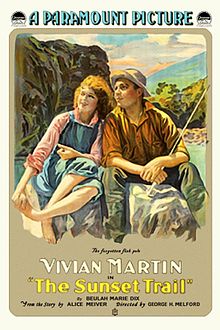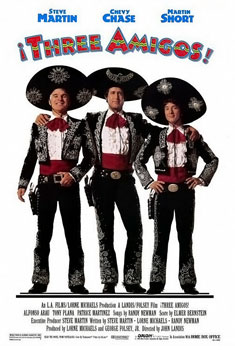
¡Three Amigos! is a 1986 American Western comedy film directed by John Landis, written by Lorne Michaels, Steve Martin, and Randy Newman, produced by Michaels and George Folsey Jr., and starring Martin, Chevy Chase, Martin Short, Alfonso Arau, Tony Plana, Patrice Martinez, and Joe Mantegna. It is the story of three American silent film stars who are mistaken for real heroes by the suffering people of a small Mexican village. The actors must find a way to live up to their reputation and stop a malevolent group of bandits.

Rebecca of Sunnybrook Farm is a 1917 American silent comedy-drama film directed by Marshall Neilan based upon the 1903 novel of the same name by Kate Douglas Wiggin. This version is notable for having been adapted by famed female screenwriter Frances Marion. The film was made by the "Mary Pickford Company" and was an acclaimed box office hit. When the play premiered on Broadway in the 1910 theater season the part of Rebecca was played by Edith Taliaferro.

The Squaw Man is a 1918 American silent Western film directed by Cecil B. DeMille. It is a remake of DeMille's 1914 film of the same name, which is based upon a 1905 play by Edwin Milton Royle. The film was reportedly made as an experiment to prove DeMille's theory that a good film is based on a good story. It cost $40,000 to make and grossed $350,000. It would be remade again by DeMille in 1931.
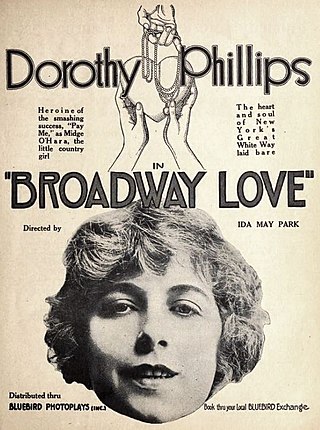
Broadway Love is a 1918 American silent romance film directed by Ida May Park and starring Dorothy Phillips, William Stowell, and Lon Chaney. It was written by Ida May Park, based on the novelette by W. Carey Wonderly.

Her Country's Call is a 1917 American silent drama film directed by Lloyd Ingraham and starring Mary Miles Minter, along with George Periolat and Allan Forrest. The film is the final instalment in a series a films written by Abraham Lincoln impersonator Benjamin Chapin, who also appeared in the film as Lincoln. It was one of many films of the time that catered to the vogue for patriotic pictures after America joined World War I, with ample shots of soldiers and the American flag. As with many of Minter's features, it is thought to be a lost film.

To-Day is a 1917 silent film drama directed by Ralph Ince, who is also credited as the film's writer, and starring Florence Reed. A story about prostitution, this film is based on a 1913 stage play Today by George Broadhurst and Abraham S. Schomer and starred Emily Stevens which ran for an astounding 280 performances in eight months' time. Actors Gus Weinburg and Alice Gale are the only actors in the film that appeared in the play. It is considered to be a lost film.

Blue Jeans is a 1917 American silent drama film, based on the 1890 play Blue Jeans by Joseph Arthur that opened in New York City to great popularity. The sensation of the play was a dramatic scene where the unconscious hero is placed on a board approaching a huge buzz saw in a sawmill, later imitated to the point of cliché.
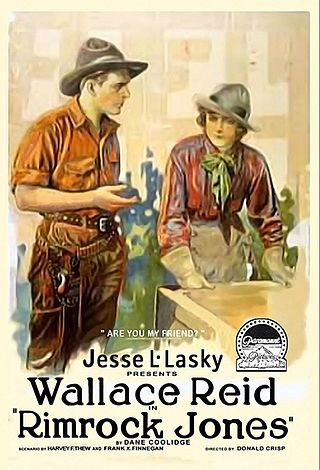
Rimrock Jones is a lost 1918 American silent Western film directed by Donald Crisp and starring Wallace Reid.

Little Miss Optimist is a 1917 American silent drama film directed by Robert Thornby and written by Gardner Hunting. The film stars Vivian Martin, Tom Moore, Charles West, Ernest Joy, Charles K. Gerrard, and Helen Bray. The film was released on August 26, 1917, by Paramount Pictures.

Lost in Transit is a lost 1917 American silent drama film directed by Donald Crisp and written by Gardner Hunting and Kathlyn Williams. The film stars George Beban, Helen Jerome Eddy, Pietro Sosso, Vera Lewis, Henry A. Barrows, and Frank Bennett. The film was released on September 3, 1917, by Paramount Pictures.

On the Level is a lost 1917 American silent Western film directed by George Melford and written by Marion Fairfax and Charles Kenyon. The film stars Fannie Ward, Jack Dean, Harrison Ford, Lottie Pickford, James Cruze, and Jim Mason. The film was released on September 10, 1917, by Paramount Pictures.

The Trouble Buster is a lost 1917 American drama silent film directed by Frank Reicher, written by Tom Forman and Gardner Hunting, and starring Vivian Martin, James Neill, Paul Willis, Charles West, Louise Harris, and Mary Mersch. It was released on October 8, 1917, by Paramount Pictures.

The Son of His Father is a 1917 American silent drama film directed by Victor Schertzinger and written by Ridgwell Cullum. The film stars Charles Ray, Vola Vale, Robert McKim, George Nichols, Charles K. French, and J. P. Lockney. The film was released on October 22, 1917, by Paramount Pictures.

His Mother's Boy is a 1917 American silent drama film directed by Victor Schertzinger and written by Ella Stuart Carson. The film stars Charles Ray, Doris May, William Elmer, Josef Swickard, Jerome Storm, and Gertrude Claire. It is based on the short story "Where Life is Marked Down" by Rupert Hughes. The film was released on December 24, 1917, by Paramount Pictures.

Jules of the Strong Heart is a lost 1918 American silent drama film directed by Donald Crisp and written by William Merriam Rouse, Frank X. Finnegan' and Harvey F. Thew. The film stars George Beban, Helen Jerome Eddy, Charles Ogle, Raymond Hatton, Guy Oliver, and Ernest Joy. The film was released on January 14, 1918, by Paramount Pictures.
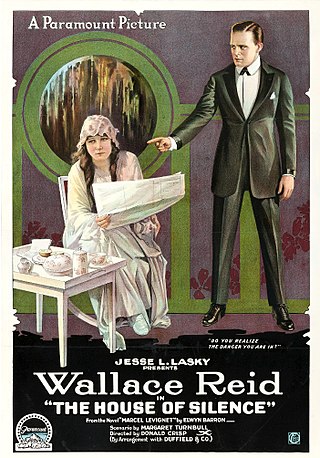
The House of Silence is a lost 1918 American silent drama film directed by Donald Crisp and written by Elwyn Alfred Barron and Margaret Turnbull. The film stars Wallace Reid, Ann Little, Adele Farrington, Winter Hall, Ernest Joy, and Henry A. Barrows. The film was released on April 8, 1918, by Paramount Pictures.

Unclaimed Goods is a 1918 American silent Western comedy film directed by Rollin S. Sturgeon and written by Gardner Hunting and Johnston McCulley. The film stars Vivian Martin, Harrison Ford, Casson Ferguson, George A. McDaniel, Dick La Reno, and George Kunkel. The film was released on April 14, 1918, by Paramount Pictures. It is not known whether the film currently survives.
Playing the Game is a 1918 American silent comedy drama film directed by Victor Schertzinger and written by Julien Josephson and R. Cecil Smith. The film stars Charles Ray, Doris May, Harry L. Rattenberry, Robert McKim, William Elmer, and Leota Lorraine. The film was released on May 5, 1918, by Paramount Pictures. It is not known whether the film currently survives, and it may be a lost film.
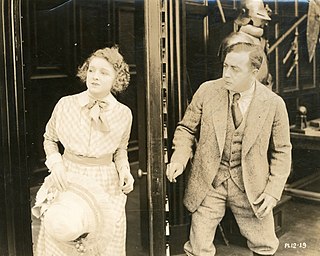
Viviette is a 1918 American silent drama film directed by Walter Edwards, written by Julia Crawford Ivers and William J. Locke, and starring Vivian Martin, Eugene Pallette, Harrison Ford, Kate Toncray, Clara Whipple, and Donald Blakemore. It was released on June 9, 1918, by Paramount Pictures.
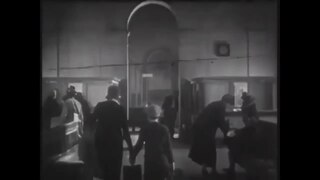
Let 'Er Go Gallegher was a 1928 silent crime comedy film directed by Elmer Clifton and starring Frank Coghlan Jr., Harrison Ford and Elinor Fair. The film is based on the Gallegher character from American author Richard Harding Davis' 1891 publication Gallegher and Other Stories. The film's sets were designed by the art director Stephen Goosson.
